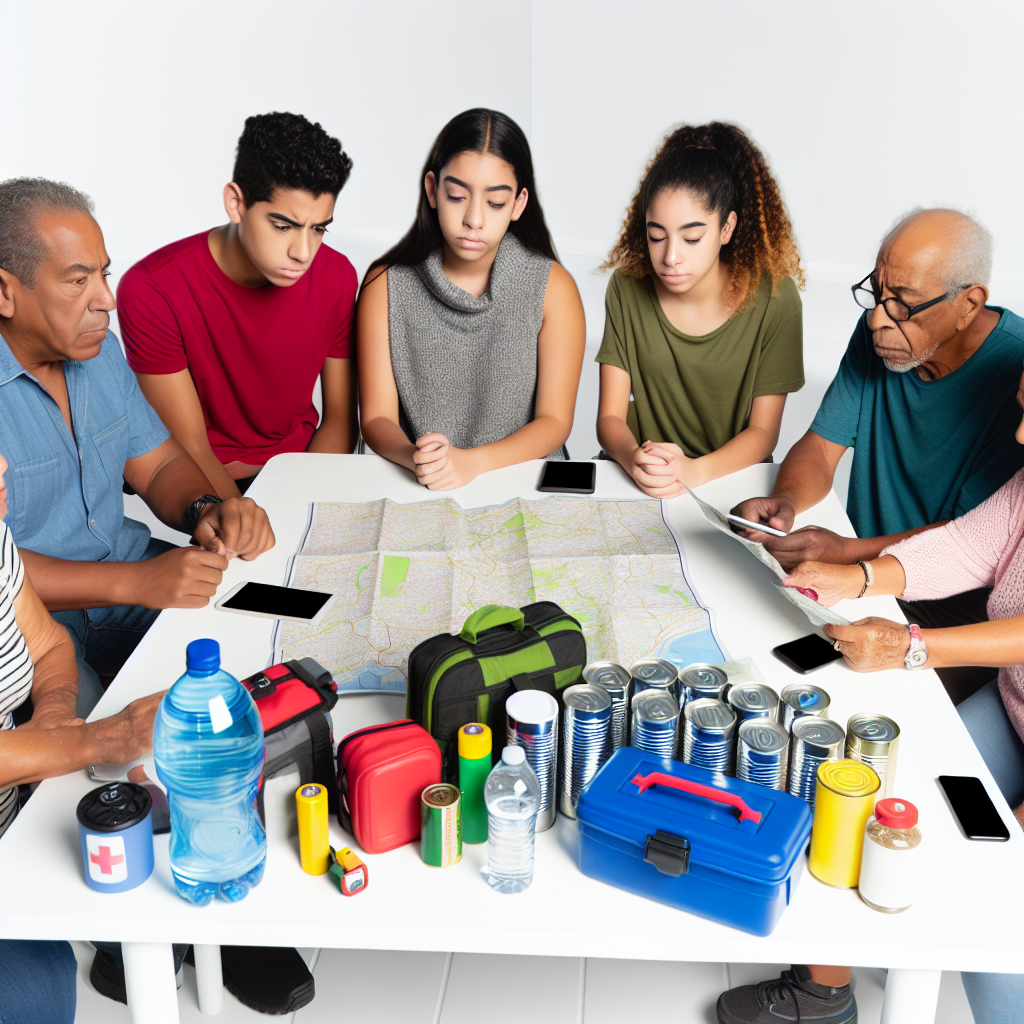Emergency Preparedness: Creating a Plan for Unexpected Situations

Emergency Preparedness: Creating a Comprehensive Plan for Vacation Rental Managers
As a vacation rental manager, ensuring the safety and well-being of your guests should be a top priority. In this blog post, we delve into the crucial aspects of developing a comprehensive emergency plan for your vacation rental property. From understanding the importance of emergency preparedness to identifying key elements of an effective plan, we guide you through creating a robust emergency response strategy. Learn how to handle unexpected situations with confidence and implement best practices for vacation rental management to safeguard your guests and property. Stay ahead of the curve and be prepared for any eventuality.
Understanding the Importance of Emergency Preparedness
Emergency preparedness is a crucial aspect of ensuring safety and security in both personal and business settings. Whether you are a homeowner, a landlord, or a vacation rental owner, having a well-thought-out emergency plan can make a significant difference in mitigating risks and protecting lives and property. Understanding the importance of emergency preparedness is the first step towards creating a comprehensive plan that can effectively address unexpected situations.
Several resources provide valuable insights into emergency preparedness for different scenarios. For landlords, the article on Emergency Preparedness for Landlords: A Step-by-Step Guide offers practical tips on how to prepare rental properties for emergencies and ensure tenant safety. Vacation rental owners can benefit from resources like Preparing Your Vacation Rental for Emergency Situations and Is Your Vacation Rental Emergency-Proof?, which provide insights into safeguarding properties and guests during unexpected events.
One essential aspect of emergency preparedness is having a clear crisis management plan in place. Event planners can refer to the guide on Emergency Preparedness for Event Planners: A Crisis Management Guide to learn how to anticipate and respond to emergencies during events effectively. Additionally, resources like PREPARENESS TIPS FOR YOUR VACATION RENTAL offer specific tips for vacation rental owners to ensure readiness for natural disasters and other unforeseen circumstances.
By leveraging these resources and incorporating best practices into your emergency preparedness plan, you can enhance safety measures, minimize risks, and be better equipped to handle unexpected situations effectively. Remember, being proactive and prepared is key to safeguarding yourself, your property, and those around you in times of crisis.
Key Elements of a Vacation Rental Emergency Plan

When it comes to managing a vacation rental property, having a well-thought-out emergency plan is crucial to ensure the safety and well-being of guests and protect your property. To create an effective vacation rental emergency plan, there are key elements that should be considered to handle unexpected situations with efficiency and professionalism.
-
Risk Assessment: Conduct a thorough risk assessment of your vacation rental property to identify potential hazards such as fire risks, natural disaster vulnerabilities, and safety concerns. Understanding the specific risks associated with your property will help you tailor your emergency plan accordingly.
-
Communication Protocols: Establish clear communication protocols for both guests and staff in case of emergencies. Provide guests with emergency contact information, evacuation procedures, and instructions on how to report any issues promptly. Utilize communication tools like text messaging services or emergency notification systems for efficient communication during crises.
-
Emergency Contacts: Maintain a list of emergency contacts including local authorities, medical facilities, maintenance services, and insurance providers. Ensure that this information is easily accessible to guests and staff in case immediate assistance is required.
-
Emergency Supplies: Stock your vacation rental property with essential emergency supplies such as first aid kits, flashlights, batteries, and emergency food and water supplies. Regularly check and replenish these supplies to ensure they are readily available in case of emergencies.
-
Training and Drills: Conduct regular training sessions and emergency drills with your staff to ensure everyone is familiar with their roles and responsibilities during emergencies. Practice scenarios like fire drills or evacuation procedures to enhance preparedness and response efficiency.
By incorporating these key elements into your vacation rental emergency plan, you can proactively mitigate risks, respond effectively to unexpected situations, and provide a safe and secure environment for your guests.
Creating a Comprehensive Emergency Response Strategy
Creating a Comprehensive Emergency Response Strategy is crucial for individuals and businesses alike to effectively handle unexpected situations. By developing a well-thought-out plan, you can mitigate risks, protect lives, and minimize potential damages. To create a robust emergency response strategy, consider the following key components:
-
Risk Assessment: Begin by conducting a thorough risk assessment to identify potential hazards specific to your location or business. Understanding the risks you face will help you tailor your emergency response plan accordingly.
-
Emergency Response Systems: Familiarize yourself with different emergency response systems and protocols. Resources like Understanding Emergency Response Systems in Short-Term Rentals can offer valuable information on implementing effective response systems.
-
Plan Development: Utilize resources such as the Federal Emergency Management Agency's guide on Developing and Maintaining Emergency Operations Plans to structure your emergency response plan effectively. This guide outlines best practices for creating comprehensive plans tailored to your specific needs.
-
Training and Drills: Regular training sessions and emergency drills are essential to ensure that everyone knows their roles and responsibilities during a crisis. Practice scenarios outlined in 5 Steps To Emergency Preparedness For Any Disaster - Facilitiesnet to enhance preparedness.
-
Communication Plan: Establish a clear communication plan to ensure timely and accurate dissemination of information during emergencies. Articles like Planning a Vacation? Make an Emergency Plan for Peace of Mind - American Red Cross emphasize the importance of communication in emergency preparedness.
By incorporating these elements into your emergency response strategy, you can enhance your readiness to handle unexpected situations effectively and protect both people and property.
Handling Unexpected Situations with Confidence

Handling unexpected situations with confidence is a crucial aspect of emergency preparedness, especially for individuals managing rental properties or organizing events. Whether it's a natural disaster, maintenance emergency, or sudden breakdown, being prepared can make all the difference in effectively managing the situation. Here are some key strategies to help you navigate unexpected events with poise and efficiency:
-
Stay Informed: Keep yourself updated on potential risks and emergency procedures relevant to your location or industry. Articles like Preparing Your Vacation Rental For A Natural Disaster and Emergency Preparedness for Event Planners: A Crisis Management Guide offer valuable insights into preparing for unforeseen circumstances.
-
Create a Comprehensive Plan: Develop a detailed emergency response plan that outlines protocols for different scenarios. Include contact information for emergency services, maintenance professionals, and relevant stakeholders. Refer to Is Your Vacation Rental Emergency-Proof? for tips on safeguarding your rental property.
-
Regular Maintenance Checks: Proactive maintenance can help prevent sudden breakdowns. Follow advice from Advice for Dealing With Maintenance Emergencies at Your Rentals to stay on top of maintenance tasks and address issues promptly.
-
Training and Drills: Conduct regular training sessions and emergency drills to ensure that everyone involved knows their roles and responsibilities during a crisis. Practice scenarios like fire drills or evacuation procedures to build confidence and readiness.
-
Emergency Kit: Prepare an emergency kit with essential supplies such as first aid items, flashlights, batteries, and non-perishable food. Store this kit in a readily accessible location for quick access during emergencies.
By implementing these strategies and staying prepared, you can handle unexpected situations with confidence and ensure the safety and well-being of your guests, tenants, or event attendees. Remember, being proactive and having a well-thought-out plan can make a significant difference in mitigating the impact of unexpected events.
Implementing Best Practices for Vacation Rental Management
When it comes to managing vacation rentals, being prepared for unexpected situations is crucial to ensure the safety of guests and protect your property. Implementing best practices for vacation rental management involves a combination of proactive planning, clear communication, and quick response strategies.
-
Understand Key Concepts: Familiarize yourself with property management fundamentals by reading articles like Property Management 101: Understanding Key Concepts and Best Practices. This will provide you with a solid foundation to build your emergency preparedness plan upon.
-
Natural Disaster Preparedness: Incorporate tips from Preparing Your Vacation Rental For A Natural Disaster to safeguard your property against potential natural calamities. This may include securing loose items, having emergency supplies on hand, and creating evacuation plans.
-
Emergency Response Guide: Refer to resources like Emergency Preparedness for Landlords: A Step-by-Step Guide to develop a comprehensive emergency response guide tailored to your vacation rental property. Include contact information for local emergency services and clear instructions for guests.
-
Regular Maintenance Checks: Follow the 11 steps outlined in 11 Steps to Manage Your Vacation Rental Property to stay on top of maintenance tasks. Regular inspections can help identify potential hazards and address them before they escalate.
-
Evaluate Emergency-Proofing Measures: Assess if your vacation rental is truly emergency-proof by considering suggestions from Is Your Vacation Rental Emergency-Proof?. Implement necessary upgrades such as installing smoke detectors, carbon monoxide alarms, and fire extinguishers.
By incorporating these best practices into your vacation rental management strategy, you can enhance the safety and security of your property, ensuring a positive experience for guests while mitigating risks associated with unexpected situations.
Conclusion
In conclusion, prioritizing emergency preparedness is crucial for ensuring the safety and well-being of both guests and property owners in vacation rental management. By understanding the importance of having a solid emergency plan in place, including key elements like communication protocols and evacuation procedures, you can effectively respond to unexpected situations with confidence and professionalism. Creating a comprehensive emergency response strategy that addresses various scenarios and regularly updating it is essential for staying prepared at all times.
Remember to handle unexpected situations calmly and efficiently, utilizing the best practices for vacation rental management to mitigate risks and ensure a positive guest experience. Stay proactive by conducting regular drills, training staff members, and maintaining open communication with guests. By implementing these strategies and continuously improving your emergency preparedness plan, you can create a safe and secure environment for everyone involved. Stay informed, stay prepared, and stay safe.
References
- Emergency Preparedness for Landlords: A Step-by-Step Guide
- Preparing Your Vacation Rental for Emergency Situations
- Is Your Vacation Rental Emergency-Proof?
- Emergency Preparedness for Event Planners: A Crisis Management Guide
- PREPARENESS TIPS FOR YOUR VACATION RENTAL
- Understanding Emergency Response Systems in Short-Term Rentals
- Developing and Maintaining Emergency Operations Plans
- 5 Steps To Emergency Preparedness For Any Disaster - Facilitiesnet
- Planning a Vacation? Make an Emergency Plan for Peace of Mind - American Red Cross
- Property Management 101: Understanding Key Concepts and Best Practices
- Preparing Your Vacation Rental For A Natural Disaster
- Advice for Dealing With Maintenance Emergencies at Your Rentals
- 11 Steps to Manage Your Vacation Rental Property
